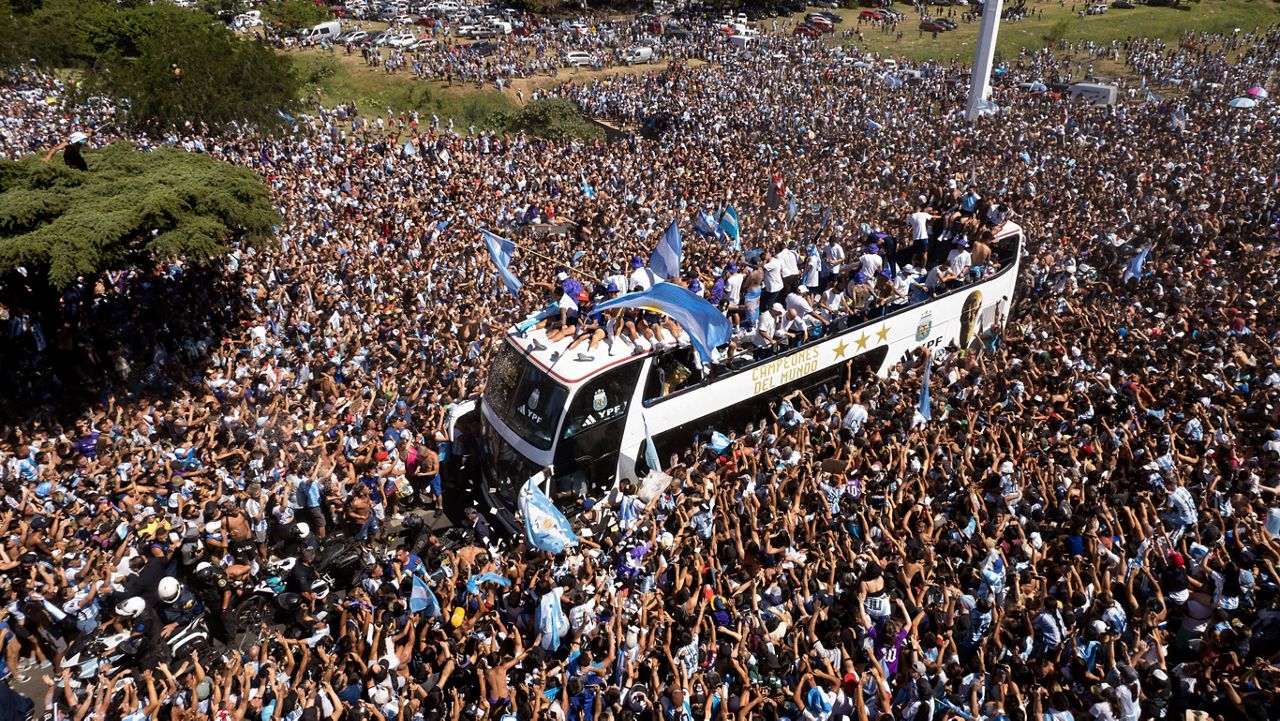Hundreds of thousands of fans streamed into the streets of Buenos Aires Tuesday, eager to catch a glimpse of the open-top bus carrying the Argentine national soccer team that won one of the greatest World Cup finals of all time.
The bus left the Argentine Football Association headquarters outside the capital and was moving slowly as thousands lined the highway, many waving Argentine flags.
Team Captain Lionel Messi and the rest of the players waved at fans from the bus as they carried the World Cup trophy aloft after securing the country's third title and its first since 1986.
“This is madness, it's indescribable,” said Brian Andreassi, 23, as he walked downtown wearing the team's jersey. “There are no words.”
The World Cup and the success of the Messi-led squad has brought much-needed good news for a country that has been stuck in economic doldrums for years, suffers one of the world’s highest inflation rates and where nearly 4-in-10 people live in poverty.
“There’s an immense union among all Argentines — unity, happiness. It's as if you can breathe another air, there's another energy in the air," said Victoria Roldán. “My body and heart are about to burst.”
Carrying a World Cup replica, the 32-year-old was headed downtown with her sister, Mariana, as they tried to figure out the best spot to catch a glimpse of the team, and in particular, its captain.
“We're going where they say Leo will be because we're dying to see him,” Roldán said. “Seeing him with that immense smile, with those bright eyes filled with hope, it really fills our heart with joy and happiness. We're very happy for this country to enjoy this happiness and I think that Leo has deserved it for years, and this was his moment.”
The players were all smiles as they watched the multitudes of fans gathered to see them, many trying to get as close as possible to the bus. An estimated 4 million people were in the streets by Tuesday afternoon, according to local media citing police sources.
Celebrating fans took over highways, avenues and the access routes into the capital, often slowing the bus carrying the players to a crawl as temperatures climbed to 86 degrees Fahrenheit.
Uncertainty over the bus route led to exasperation among fans, many of whom had traveled hundreds of miles.
“We're a little disoriented because we don't know the route and a little frustrated because we traveled so many kilometers and may not be able to see them,” said Giselle Pisani, 34, who traveled 220 miles with her family from the town of Olavarria.
Thousands had set up camp since early Tuesday morning at the Obelisk, the iconic Buenos Aires landmark that is the traditional site of celebrations. But as the number of people grew, it was unclear whether the bus would go there amid concern that it would not be able to pass safely.
President Alberto Fernández declared a national holiday Tuesday so the country could celebrate the World Cup victory.
The song “Muchachos,” which was written by a fan and became a popular unofficial anthem for the Argentine team at the World Cup filled the streets as fans joined in singing it over and over again.
Some fans also paid tribute to Argentine soccer legend Diego Maradona, the captain of the 1986 squad that won the World Cup and who died two years ago, with flags bearing his name and face. “This is for Diego, who's seeing it from heaven,” fans chanted.
“This is a party. The last time Argentina was a champion I was 3 years old, I don’t remember anything,” said Yael Torchinsky, 39. “I want to live this intensely because the Argentine people need this happiness.”
By mid-afternoon, fans started filling up Plaza de Mayo in front of Government House, amid rumors the players might go there for a reprise of the festivities for Argentina's 1986 World Cup victory, although no one knew for certain.
Fernández’s administration had offered the palatial mansion, popularly known as the Casa Rosada, or Pink House, according to Security Minister Aníbal Fernández. There were no plans for Fernández, nor any other officials of his unpopular government, to participate in the celebrations.
Thousands of fans had lined up before dawn to welcome the team home from Qatar.
The players were beaming as they descended from their plane in Ezeiza, outside Argentina’s capital, shortly before 3 a.m. onto a red carpet. Messi was the first one out, carrying the World Cup trophy, flanked by coach Lionel Scaloni, who put his arm around the captain as they walked past a sign that read, “Thank you, champions.”
The team was welcomed by rock band La Mosca singing “Muchachos," and several players, including Messi, could be seen singing the words as they boarded the bus taking them to the Argentine Football Association headquarters.
It took the bus an hour to travel the 6.8 miles from the airport to AFA headquarters, where the players were welcomed with fireworks, and then spent the night. In the morning, Messi posted a photo on social media showing him hugging the World Cup trophy next to him while he slept.
Before the team's arrival, many had kept a close eye on the flight bringing the players home. As the plane got closer to Argentine soil, almost 200,000 people were tracking its path online and news channels gave live coverage of the arrival.
Several players posted photos of the plane ride on social media. In one, Nicolás Tagliafico posted an image of the World Cup trophy buckled into an airplane seat as if it were just another passenger.
Fernández retweeted several messages of congratulations from other world leaders, including Russian President Vladimir Putin.
“Thank you for this greeting President Putin,” Fernández wrote on Twitter after a telephone call with the Russian leader. “Let the happiness that today unites Argentina with so many countries in the world serve as an example: Our societies need unity and peace.”



